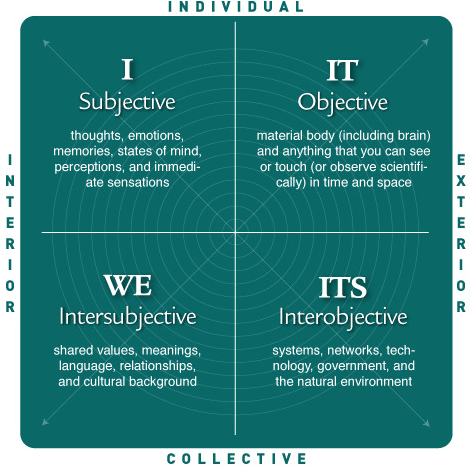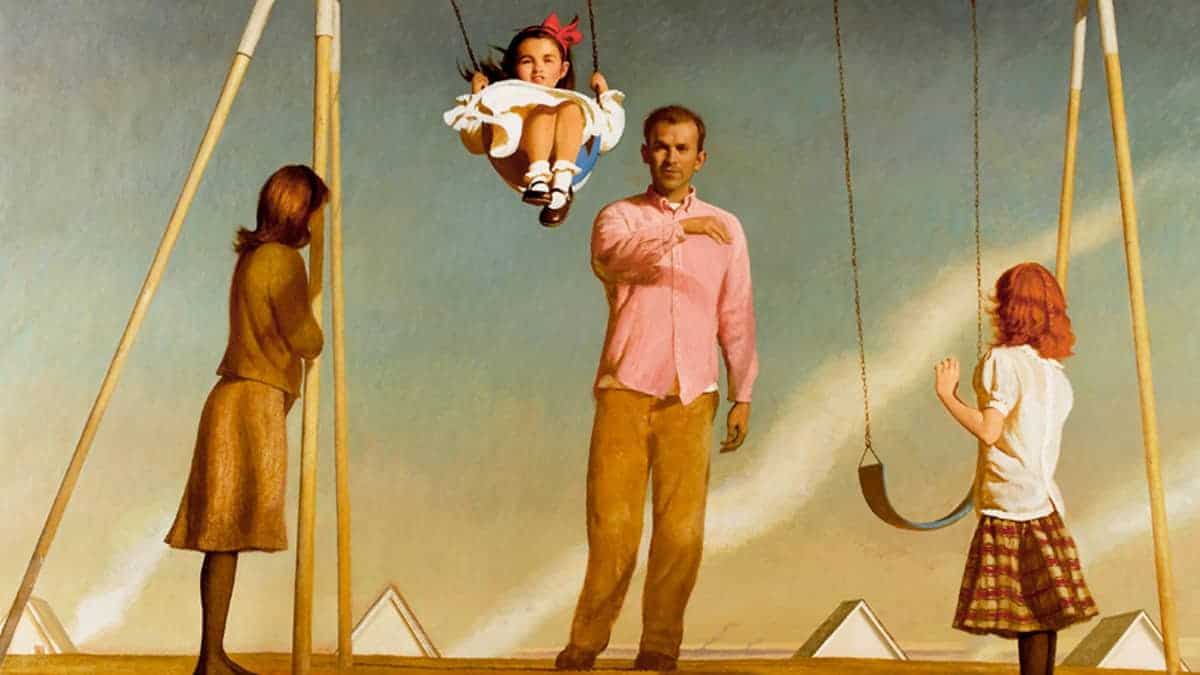Miriam Mason Martineau and Ken Wilber offer invaluable insight for all parents — new, old, and expecting — to help align yourself with a somewhat more integral, more spiritual approach to parenting.
Written by Corey deVos
Image: America by Bo Bartlett [view gallery]
Without a doubt, parenting would be a lot easier if our children were born with instruction manuals. There is so much conflicting literature out there about the best ways to raise our children, with new studies being published every day to discredit the ones that came out yesterday. Everyone wants what’s best for their child, but when our concept of “best” gets defined and redefined every other day, it’s hard to know which direction we should be facing.
This is why we are so lucky to have Miriam Mason Martineau, whose Parenting as a Spiritual Practice webcourse helps us to cut through the confusion. Using the integral vision to piece together these many approaches to parenting into a more coherent whole, Miriam’s course offers powerful perspectives and practices to discover the unshakable bedrock of love, presence, and ever-present consciousness at the core of our being. As parents we are literally shaping the face of tomorrow, and as such, Miriam’s course is an absolutely invaluable tool for parents everywhere, regardless of your familiarity with integral thought.
As a first-time father of a beautiful little girl who is facing some fairly intense challenges in these first chapters of her life, the integral vision has helped me tremendously in my journey as a parent. Not only has it helped my wife and me to cope with the many challenges we have faced over the last year and a half (“hurts more, bothers you less”), but this extraordinary vision of wholeness constantly reminds us that we are also still growing up alongside our daughter, and helps us remain conscious of all our various shadows and blindspots which, if left unattended, could easily have a harmful impact on her fragile and rapidly developing psyche.
More than anything, the integral vision has helped us to see more of our daughter — to see more of her being, more of her becoming, more of her unique manifestation in the world. And quite simply, the more we can see, the more we can love.
So how exactly does the integral vision help me see more? Well let’s just run through a few quick examples, using the Four Quadrants described by integral theory:

- In the Upper Left quadrant, the most obvious benefit is possessing a keen understanding of development itself — what developmental stages she is currently growing through, and what new stages are beginning to come online. I know what kinds of intelligences, capacities, and talents that will develop throughout her life, allowing me to help her excel and to better support her wherever she might need it. Not only does this help me better guide her through these stages and anticipate the possible challenges that may arise, but it actually helps me take her perspective and see the world through her eyes.
- In the Upper Right quadrant I can better understand and nourish her physical health, which is particularly important for a little girl who is overcoming chronic liver disease. It also helps me recognize what kinds of behavior to expect with each developmental stage, and what forms of compassionate discipline are appropriate to meet her with at each of these stages.
- In the Lower Right quadrant we find all the various systems that surround and support my daughter, including the physical environment of our household (particularly stressful now that she is beginning to crawl!) In dealing with our daughter’s health issues, we have already interfaced with a number of complex systems, some of which have been absolutely miraculous (the team and facilities at Children’s Hospital, the online fundraiser we were able to do with you all, the ACA reform that ensures that her care will never be denied due to pre-existing conditions or lifetime caps on medical expenses) while others have been endlessly frustrating. As soon as they come to this earth, our children enter a tangled web of systems. It is our duty as parents to consciously consider these systems and discern whether they will provide whatever it is our children need, and to identify and compensate for any needs that are not being met.
- Finally, in the Lower Left quadrant I can better see and moderate the many cultural influences that are shaping her experience of the world, ranging from family dynamics and the way I interact with my wife, to the beautiful integral community that we are a part of, to the ubiquitous onslaught of media culture that will certainly leave an indelible mark on her consciousness. More than that, I can see the many roles that I play in our relationship: I am her teacher, her nurturer, her protector, her playmate, her therapist, her provider, her physician, and the list goes on. Each of these roles brings its own unique texture to our relationship — the more consciously I can embody them and the more fluidly I can move from one role to the next, then the better a role model I can be, and the deeper our relationship can become.
Of course, an integral approach to parenting is so much more than a theoretical list of factors to check off one by one, and Miriam’s brilliance lies with her ability to help us find the simplicity on the other side of all this complexity. Her course is elegantly designed to help us remain fully present and engaged with our child, to source our deepest intuition that tells us what the most appropriate thing to do is in any circumstance, to resist the temptation to hold ourselves to an impossible standard of perfection as parents, and to forgive ourselves for the mistakes we will inevitably make as we travel this path together.
Miriam’s Parenting as a Spiritual Practice course is a true gift to this world. In my mind there is no application of integral thought more important or more meaningful than this, and we are all deeply grateful to Miriam for sharing her incredible wisdom, grace, and insight with us all.
Become a member today to listen to this premium podcast and support the global emergence of Integral consciousness
Membership benefits include:
Premium Content
Receive full access to weekly conversations hosted by leading thinkers

Journal Library
Receive full access to the growing Journal of Integral Theory & Practice library

Live Experiences
Stay connected by participating in Integral Life live events and discussions
Courses & Products
Get unlimited 20% discount off all products and courses from our friends and partners

Free Bonus Gifts
Download The Integral Vision eBook by Ken Wilber (worth $19 on Amazon) & The Ken Wilber Biography Series

Support of the movement
Support our mission of educating and spreading integral consciousness that is more critical than at any time in its history
About Miriam Martineau
Miriam Mason Martineau, M.A., is trained in the areas of psychology, dance, choreography, and voice. She has a Masters Degree in Psychology from the University of Zurich, with a specialization in Youth and Child Psychology, and is also a certified teacher of Laban Modern Dance, as well as a singer and vocal instructor.
About Ken Wilber
Ken Wilber is a preeminent scholar of the Integral stage of human development. He is an internationally acknowledged leader, founder of Integral Institute, and co-founder of Integral Life. Ken is the originator of arguably the first truly comprehensive or integrative world philosophy, aptly named “Integral Theory”.

